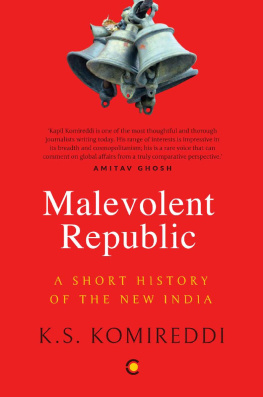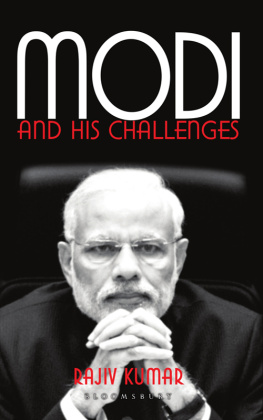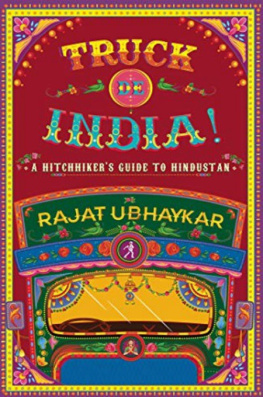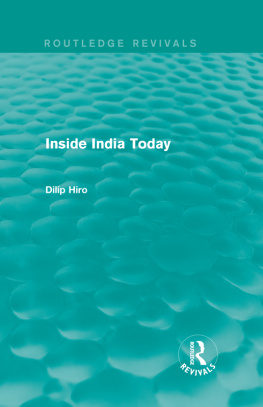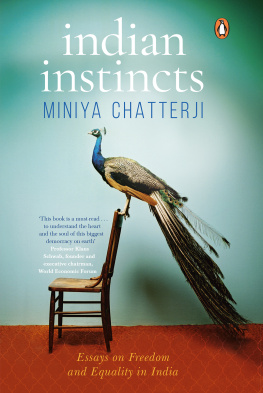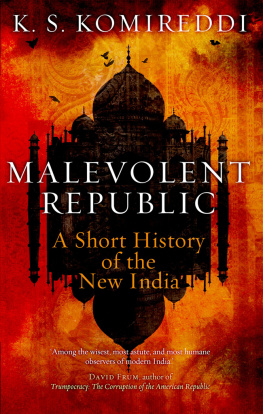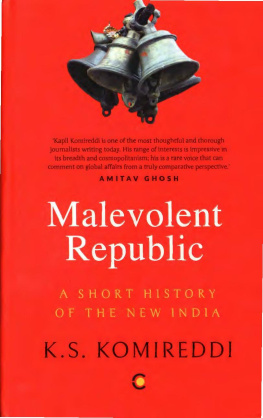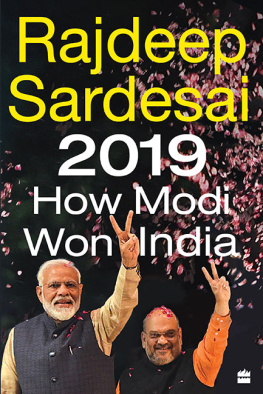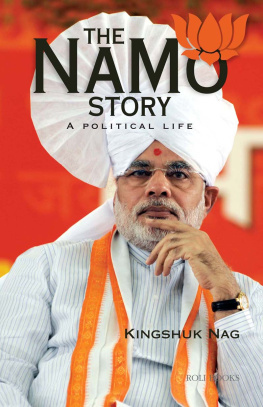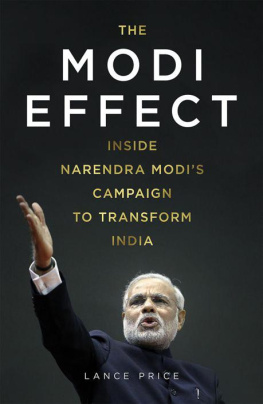


First published in the United Kingdom in 2018 by C. Hurst & Co. (Publishers) Ltd First published in India by Context, an imprint of Westland Publications Private Limited, in 2019
1st Floor, A Block, East Wing, Plot No. 40, SP Infocity, Dr MGR Salai, Perungudi, Kandanchavadi, Chennai 600096
Westland, the Westland logo, Context and the Context logo, are the trademarksof Westland Publications Private Limited, or its affiliates.
Copyright K.S. Komireddi, 2019
K.S. Komireddi asserts his moral right to be identified as the author of this work.
All rights reserved
For sale only within the territories of India, Bangladesh, Bhutan, Maldives, Nepal, Pakistan and Sri Lanka. Any circulation of this edition outside these countries is strictly prohibited and unauthorised.
No part of this book may be reproduced, or stored in a retrieval system, or transmitted in any form or by any means, electronic, mechanical, photocopying, recording, or otherwise, without express written permission of the publisher.
ISBN: 9789387894969
To my mother
Contents
It would be a boon to democracy if one of the great nations of the world proves that it is possible to provide a good living for everyone without surrendering to a dictatorship of either the right or left India is a tremendous force for peace and non-violence, at home and abroad. It is a land where the idealist and the intellectual are yet respected. We should want to help India preserve her soul and thus help to save our own.
Dr Martin Luther King, Jr, 1959
We noticed nothing as we went,
A straggling crowd of little hope,
Ignoring what the thunder meant
Nissim Ezekiel
Saare jahaan se achhaa, Hindositaan hamaraa. My days began with those words when I was a child. Better than all the world is our India. I chanted them, in a school assembly of a hundred or so boys, facing the Indian flag, every morning for four months. The author of this unabashed ode to India, the great poet Iqbal, had not actually seen the world beyond the subcontinent when he published it at the beginning of the twentieth century; and, after a brief sojourn abroad, he recoiled from the songs pan-Indian timbre and reinvented himself as an exponent of ruinous ethno-religious nationalism, the spiritual father of the idea of religious segregation that culminated in the Partition of India and the birth of Pakistan. But we did not know this then. And so, at one of the first schools I attended, which was really a madrassah, an Islamic seminary, we recited every morning of the week, in the shade of the mosque that soared behind the flagpole, Iqbals verses exalting Indias specialness. We are Indian, we sang in chorus. India is our homeland.
The mosque, which lent grandeur to the school, looked so majestic that I thought the Taj Mahal must have been modelled on it. For a while, I thought it was the Taj. At noon, the boys, led by an elderly man with a soft beard and thick black glasses, went there to pray. The only non-Muslim pupil, I was left on my own. I was sitting alone in the classroom when a man walked in and asked me why I wasnt at prayer. He was tall and slender, with a pencil-thin moustache and black eyes lined with kohl. I had seen him before, always in a loose-fitting kurta standing at the back of the assembly, almost an adult. I wasnt allowed to, I said. O, you are that boy, he said excitedly, as though he had just confirmed some improbable rumour. He walked over and sat next to me. No one is prohibited from praying, he said. Ask your father to buy you a cap. Ill take you to the mosque. He then offered me his protection: If anyone gives you trouble, let me know. Ask for Murad.
He was beside himself with laughter when he saw me walking up to him a few days later with my cap on. What I was wearing was a Nehru topi, not the taqiyah, the Islamic prayer cap. My father, who had deposited me at this madrassah for a lofty reasonto inoculate me against sectarian temptations in later lifedid not know the difference, and had bought me a hat made popular by Indias notoriously ungodly founding prime minister.
But no matter. Any head covering would do, Murad said. We stood beneath the imposing dome that afternoon, and I, after rinsing my hands and feet, mimicked his motions, while repeating, under my breath, the only words I discerned in the call to prayer that radiated from the loudspeakers affixed to the mosques minarets: Allahu Akbar Allah.
We fell in together after that. A bond formed over afternoons of sharing lunch, praying and playing cricket. He was the first person I accepted, consciously, as a friend. He called me his brother and invited me to his house. On a Friday, when classes finished early, we rode a packed green double-decker bus to the old quarter of Hyderabad where he lived. Murad held my hand and led me through the crowds. We walked under grand identical arches that were like gateways to a fabled city, flanked on either side by carts piled with fruit and jewellery shops canopied with stacks of red and green glass bangles suspended from their lintels, and stopped at Charminar, a stupendous hazel-hued mosque with four minarets but no dome, the architectural jewel of the old city, built four decades before the Taj Mahal, slummy and chaotic now, but a few generations ago the resplendent seat of the Nizam, the ruler of Hyderabad, the richest man in the world. Unexpectedly, at the base of one of its minarets, was a Hindu temple.
I had driven past this place before. But now we walked, making our way through the late afternoon traffic of motorbikes, buses and yellow auto-rickshaws, past butcher shops with fly-blown hunks of beef and mutton hanging from hooks behind rusting grilles, exotic birds in cages, women examining saris splayed out on the floors of carpeted shops, a man outside a chemists pouring water into his mouth from a steel pitcher and gurgling and spitting it on the road.
Murads house, on the first floor of a dilapidated building, was really a small room that opened out on to the corridor, with one naked bulb and no furniture, painted green and partitioned by an old sari. There was a small cot with a thin mattress on it and calendars on the wall with pictures of Mecca. His mother, who opened the door, invited me in warmly and asked me to sit on the bed. She gave me hot milk in a small steel tumbler. Murad told his mother and sister, who sat in a corner and never spoke, that I had mastered the namaz. He was proud of me. They seemed amused by it all. And then it was time for me to go.
I asked Murad where his father was. He didnt know. They had a nicer, bigger house when he was small and his father worked in the Gulf, he said. But then his father stopped sending money and abandoned the family. The room I had seen belonged to his uncle. Murad, I discovered, wasnt just a student at the madrassah; he also did odd jobs there. He was thirteen, and his family depended upon him. His mother was asking him to quit school and take up work near their house. I had no means then to understand the precariousness of his life.
Murad had never seen a hundred-rupee note, or sat in a car, or been to the cinema. But he thought my life was grim when I told him that my family never celebrated Divali because my father thought it was vulgar. When once I pleaded with him to let me buy fireworks as we were driving home on or before Divali, my father parked the car and took me for a walk. He gestured at the crush of people sleeping on the pavements under the smoky black sky illuminated by festive flares and thrust a hundred-rupee note into my hand.
Next page
